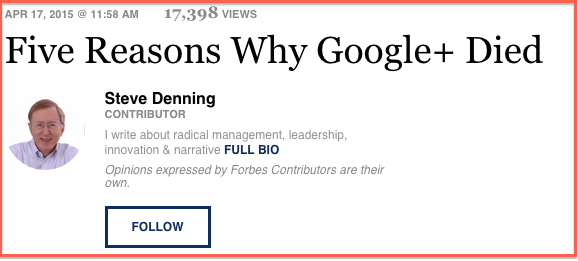Google’s new mission statement
 Writing as a Forbes contributor, Steve Denning makes a great point in his analysis of the failure of Google+, Google’s social network. “Google’s mission statement is clear and simple, but wrong,” he writes. Here’s that mission statement:
Writing as a Forbes contributor, Steve Denning makes a great point in his analysis of the failure of Google+, Google’s social network. “Google’s mission statement is clear and simple, but wrong,” he writes. Here’s that mission statement:
Google’s mission is to organize the world‘s information and make it universally accessible and useful.
As Denning puts it:
There is a curious disconnect between Google’s mission (“organize the world’s information”) and what Google actually does to earn a living (“finding stuff quickly, easily and elegantly”). . . . So long as Google thinks it is in the business of organizing the world’s information, it is likely to go on launching unprofitable businesses.
Google+, a failed Facebook clone, is one of those unprofitable businesses. Taking on Facebook head-on with an undifferentiated product was suicidal, even for Google. Google+ didn’t fulfill Google’s supposed mission: it didn’t really organize anything. (It didn’t find stuff quickly, easily, and elegantly, either.)
Google’s mission statement is more inspiring and aspirational than 90% of what I read on company sites. But only an omnipotent dictator with obsessive compulsive tendencies could organize the world’s information .
I’m here to help. So I wrote a new mission statement for Google:
Google’s mission is to provide the fastest possible connection between you and what you want to do.
This is not too rooted in the present. Everything from commerce to mobile to travel to “OK Google” voice recognition fits this mission; there is plenty of room to innovate. But unlike “organizing” the unorganized mess that is the Web, my mission is actually a goal worth striving for. And unlike the current mission statement, it actually mentions the customer.
And if Google adopts it, maybe they won’t get sucked into any more wild goose chases.
(Yes, I know I said that the quality of the unedited blog contributions on Forbes is inconsistent. But I’m happy to recognize a great one when I see it.)
Graphic: Forbes.
Just the “fastest” connection? Not the most relevant one? I ask because speed is definitely a unique value prop for Google, but so is accuracy (which is where the ‘organizing’ of information comes in).
Or perhaps “fastest” can include relevance because if they’ve succeeded in helping you do “what you want to do” quickly, then clearly it must have been accurate?
I think I just answered my own question. Never mind. 🙂
If it’s not relevant, it’s not what you want and it’s not fast. As you said.
Don’t be such a Hater!
Google+ succeeds and lives to be a niche for nerds like myself to hook up with other nerds with like minded interests.
Facebook is great place for friends and family’s to connect and wonderful for quick hits when I need a pick me up to view the vast collection of all those now visibly unhealthy, psuedo-educated, financially challenged, morally bankrupt, desperate, high-school student delegation from my pre-college years.
Teens and Grandmas love FaceBook too.
Apparently Google continues well on it’s mission to defeat evil and do good right? It’s easy to pick the losers and not mention the winners like those free ones:
Search, Maps, Earth, GMAIL, Android, You-Tube, CHROME, etc… And apparently organizing is coming along seeing how Google correctly categorized this websites name with the quality of it’s content.
Just drink the Kool-Aid, Opt-Out, Surf-Smart and keep on voting with your dollar.
You’ll be fine.
BONUS: Apparently Google SEARCH also succeeded in raising your comments by 50%.